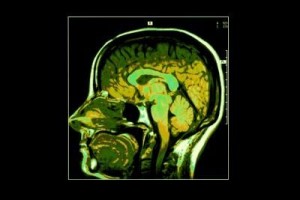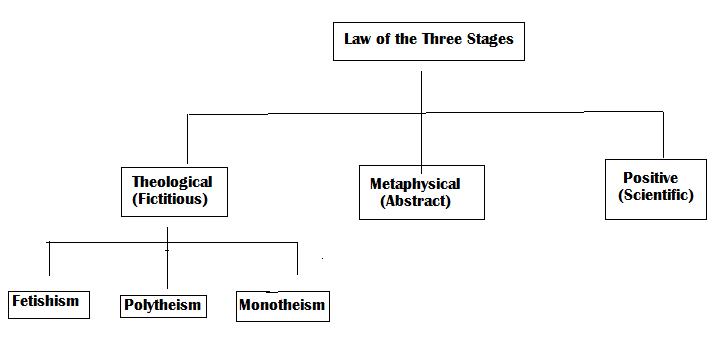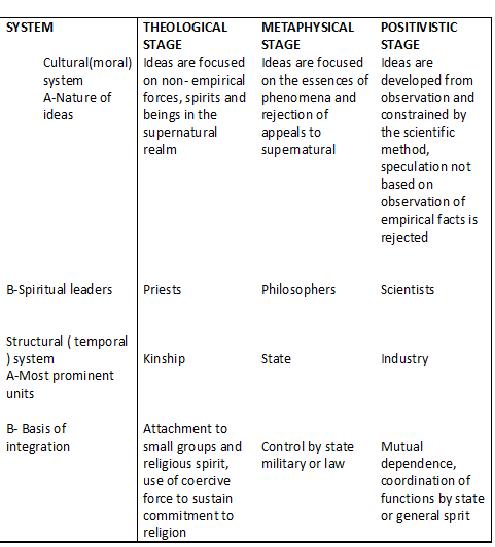Dr. V.K.Maheshwari, M.A(Socio, Phil) B.Se. M. Ed, Ph.D
Former Principal, K.L.D.A.V.(P.G) College, Roorkee, India
The “Law of Three Stages” is an idea developed by Auguste Comte. It constitutes one of the main contributions of Comte to the field of sociological thought.
Comte’s famed “law of the three stages” is an example of his search for invariant laws governing the social world. Comte argued that the human mind, individual human beings, all knowledge, and world history develop through three successive stages
According to Comte, each branch of our knowledge passes successively through the different theoretical conditions. This is known as law of three stages. The main aim of this principle is to provide the basis of sociological thinking.
According to Comte, the evolution of the human mind has paralleled the evolution of the individual mind. Just as an individual tends to be a staunch believer in childhood, a critical metaphysician in adolescence and a natural philosopher in manhood, so mankind in its growth has followed three major stages. Comte believed that each field of knowledge passes through three periods of growth pattern.
Comte felt that one of the most basic laws of human organization is the “law of the three stages,” a notion clearly influenced by the philosophical concepts of Turgot, Condorcet, and Saint-Simon. He termed these stages the theological–military , metaphysical–judicial , and scientific–industrial or “positivistic.” Each stage is typified by a particular “spirit”—a notion that first appeared with Montesquieu and was expanded by Condorcet—and by temporal or structural conditions. Thus, the theological–military stage is dominated by ideas that refer to the supernatural while being structured around slavery and the military. The metaphysical–judicial stage, which follows from the theological and represents a transition to the Scientific is typified by ideas that refer to the fundamental essences of phenomena and by elaborate political and legal forms. The scientific–industrial stage is dominated by the “positive philosophy of science” and industrial patterns of social organization.
In this context, Comte formulated the details of his law of the three stages, in which idea systems, and their corresponding social structural arrangements, pass through three phases:
The Theological/ Fictitious Stage
In this stage human beings rely on supernatural agencies to explain what they can’t explain otherwise.
The Theological, which is the original and spontaneous form of thought, regards the facts of the universe as governed not by invariable laws of sequence, but by single and direct volitions of beings, real or imaginary, possessed of life and intelligence. In the infantile state of reason and experience, individual objects are looked upon as animated. The next step is the conception of invisible beings, each of whom superintends and governs an entire class of objects or events. The last merges this multitude of divinities in a single God, who made the whole universe in the beginning, and guides and carries on its phenomena by his continued action, or, as others think, only modifies them from time to time by special interferences. [Mill's summary]
The theological stage is dominated by a search for the essential nature of things, and people come to believe that all phenomena are created and influenced by gods and supernatural forces. Monotheism is the ultimate belief of the theological stage.
According to Comte in this stage, “all theoretical conceptions, whether general or special bear a supernatural impress”. Unable to discover the natural causes of the various happenings, the primitive men attributed them to imaginary or divine forces.
This stage is also divided into three sub-stages as (a) Fetishism (b) Polytheism (c) Monotheism..
(a) Fetishism -The primitive persons everywhere tend to think in supernatural terms. They believe that all phenomena are “produced by the immediate action of supernatural beings.” They believe in all kinds of fetishes in which spirits or supernatural beings live. Hence, “New ideas and structural arrangements are added to, and build on, the old” as a form of religion started and it admitted of no priesthood, because its gods are individuals, each residing in fixed objects. During this sub-stage, man accepts the existence of the spirit or the soul. It did not admit priesthood
(b) Polytheism- When the mind of primitive man became better organized, fetishism became cumbersome. Too many fetishes created confusion. Hence, they started believing in several gods. Thus arose polytheism. They created the class of priests to get the goodwill and the blessings of these gods. The presence of too many gods also created for them mental contradictions.
During this sub-stage, man begins to believe in magic and allied activities. He then transplants or imposes special god in every object. Thus they believed in several gods and created the class of priests to get the goodwill and the blessings of these gods
(c) Monotheism- Finally, they developed the idea of one god, or of monotheism. They started believing in the superhuman power of only one god. Slowly feelings and imaginations started giving place to thinking and rationality During this sub-stage of the theological stage man believes that there is only one center of power which guides and controls all the activities of the world. Thus man believed in the superhuman power of only one god
The Metaphysical/Abstract Stage
Comte said that this stage started around the middle Ages in Europe, or somewhere around the 1300s. In the metaphysical stage of society, people viewed the world and events as natural reflections of human tendencies. People in this stage still believed in divine powers or gods, but they believed that these beings are more abstract and less directly involved in what happens on a daily basis. Instead, problems in the world are due to defects in humanity.
The metaphysical thinking is almost an extension of the theological thinking. Rationalism started growing instead of imagination. Rationalism states that God does not stand directly behind every phenomenon. Pure reasoning insists that God is an Abstract Being. Reasoning helped man to find out some order in the natural world. This stage being an improvement upon the earlier stage, it was believed that the abstract power or force guides and determines the events in the world. Metaphysical thinking discards belief in concrete god . The metaphysical stage is a transitional stage in which mysterious, abstract forces (e.g., nature) replace supernatural forces as the powers that explain the workings of the world.
The continuity, regularity and infallibility found in the natural order were attributed to some “Principles” or “Power”. Thus, principles and theories gained ascendency over feelings and speculations. Even these metaphysical explanations were unsatisfactory to the mind. Still this kind of thinking corresponded with the legal type of society
The Positive/Scientific Stage
The positivist stage is the last and highest stage in Comte’s work. In this stage, people search for invariant laws that govern all of the phenomena of the world. Comte’s final stage for society is called the. positive stage Just like the name implies, here people view the world and events as explained by scientific principles. In modern society, most people agree that the planets are physical objects made up of gas or rock. People believe that sickness is caused by germs and that medicine is the appropriate cure. If an earthquake happens, most people believe that’s because of movement in the tectonic plates, not because a god is upset.
While it’s easy for us, people who live in the modern scientific stage, to look back on people in the first two stages and think some of their beliefs are silly, keep two things in mind. First, lots of modern people still believe that one or more gods are active in what happens to our lives, and many people in modern society still believe in astrology. Second, keep in mind that in five hundred or one thousand years from now, people in the future might look back at us and think that our beliefs are silly.
The positive stage represents the scientific way of thinking. As Comte stated, “In the final, the positive stage, the mind has given over the vain search after Absolute notions, the origin and destination of the universe, and the causes phenomena, and applies itself to the study of their laws – that is, their invariable relations of succession and resemblance.”
The observation and classification of facts are the beginning of the scientific stage, where there is no place for any belief or superstition. Everything concludes rationally
.Comte developed his concept of positivism, which is a purely intellectual way of looking at the world. He stressed the need for observation and classification of phenomena. He even said that it is futile to try to determine causes. “We can observe uniformities, or laws, but it is mere speculation to assign cause to these uniformities” he stated. Positivism actually glorified observation and classification of data. The positive thinking suits the needs of the industrial society.
In short these stages represent different and opposed types of human conception. The most primitive type is theological thinking, which rests on the “empathetic fallacy” of reading subjective experience into the operations of nature. The theological perspective develops dialectically through fetishism, polytheism, and monotheism as events are understood as animated by their own will, that of several deities, or the decree of one supreme being. Politically the theological state provides stability under kings imbued with divine rights and supported by military power. As civilization progresses, the metaphysical stage begins as a criticism of these conceptions in the name of a new order. Supernatural entities are gradually transformed into abstract forces just as political rights are codified into systems of law. In the final stage of positive science the search for absolute knowledge is abandoned in favor of a modest but precise inquiry into the relative laws of nature. The absolutist and feudal social orders are replaced gradually by increasing social progress achieved through the application of scientific knowledge.
In presenting this analysis, Comte felt that he had uncovered several laws of social statics because he believed that differentiation, centralization of power, and development of a common morality were fundamentally related to the maintenance of the social order. Although he did not carry his analysis far, he presented both Herbert Spencer and Durkheim with one of the basic theoretical questions in sociology and the broad contours of the answer.
The basic cultural and structural features of these stages can be summarized in a tabular form as shown below:
COMTE’S LAW OF THREE STAGES
The above referred Table ignores many details that have little relevance to theory, but the table communicates, in a rough fashion, Comte’s view of the laws of succession. Several points should be noted:
First, each stage sets the conditions for the next. For example, without efforts to explain references to the supernatural, subsequent efforts at more refined explanations would not have been possible; or without kinship systems, subsequent political, legal, and military development would not have occurred, and the modern division of labor would not have been possible.
Second, the course of Integration through, mutual interdependence, centralization of authority, and common culture.
The Social differentiation Increased potential for social pathology problems of integration, coordination, and control
Comte saw all idea systems as passing through the theological and metaphysical stages and then moving into the final, positivistic, stage. Ideas about all phenomena must pass through these phases, with each stage setting the conditions for the next and with considerable intellectual turmoil occurring during the transition from one stage to the next. Ideas about various phenomena, however, do not pass through these stages at the same rate, and, in fact, a positivistic stage in thought about one realm of the universe must often be reached before ideas about other realms can progress to the positivistic stage. The opening pages of Positive Philosophy emphasize, we must bear in mind that the different kinds of our knowledge have passed through the three stages of progress at different rates, and have not therefore arrived at the same time. The rate of advance depends upon the nature of knowledge in question, so distinctly that, as we shall see hereafter, this consideration constitutes an accessory to the fundamental law of progress. Any kind of knowledge reaches the positive stage in proportion to its generality, simplicity, and independence of other departments.
Thus, thought about the physical universe reaches the positive stage before conceptions of the organic world do because the inorganic world is simpler and organic phenomena are built from inorganic phenomena.
Comte’s “Law of the Three Stages evolution is additive.
They are first supplemented with new ideas and structural arrangements which are added to, and build on, the old, and
Secondly dominated, by new social and cultural arrangements.
Third, during the transition from one stage to the next, elements of the preceding stage conflict with elements of the emerging stage, creating a period of anarchy and turmoil.
Fourth, the metaphysical stage is a transitional stage, operating as a bridge between theological speculation and positivistic philosophy.
Fifth, the nature of cultural ideas determines the nature of social structural (temporal) arrangements and circumscribe what social arrangements are possible.
And sixth, with the advent of the positivistic stage, true understanding of how society operates is possible, allowing the manipulation of society in accordance with the laws of statics and dynamics.
Although societies must eventually pass through these three stages, they do so at different rates. Probably the most important of the variable empirical conditions influencing the rate of societal succession is population size and density, an idea taken from Montesquieu and later refined by Durkheim. Thus, Comte felt that he had discovered the basic law of social dynamics in his analysis of the three stages, and coupled with the laws of statics, a positivistic science of society—that is, social physics or sociology—would allow for the reorganization of the tumultuous, transitional, and conflict dominated world of the early nineteenth century philosophy.
Several points in this law were given greater emphasis in Comte’s later work. It states that society as a whole, and each particular science, develops through these mentally conceived stages. in which idea systems, and their corresponding social structural arrangements, pass through these phases:
First, the social world reveals both cultural and structural dimensions, with the nature of culture or idea systems being dominant— an idea probably taken from Condorcet
Second, idea systems, and the corresponding structural arrangements that they produce, must reach their full development before the next stage of human evolution can occur. Thus, one stage of development creates the necessary conditions for the next.
Third, there is always a period of crisis and conflict as systems move from one stage to the next because elements of the previous stage conflict with the emerging elements of the next stage.
Fourth, movement is always a kind of oscillation, for society “does not, properly speaking, advance in a straight line.”
These aspects of the law of three stages convinced Comte that cultural
ideas about the world were subject to the dictates of this law. All ideas about the nature of the universe must move from a theological to a scientific, or positivistic, stage. Yet some ideas about different aspects of the universe move more rapidly through the three stages than others do. Indeed, only when all the other sciences—first astronomy, then physics, later chemistry, and finally physiology—
have successively reached the positive stage will the conditions necessary for social physics have been met. With the development of this last great science, it will become possible to reorganize society by scientific principles rather than by theological or metaphysical speculations.
According to Prof. N.S. Timasheff, “Comte’s law of the three stages in the meaning ascribed to it by its inventor is clearly invalid. “As he opines, “neither of the later approaches wholly supersedes the religious approach; rather, there has been accumulation and often admixture of the three.” He further writes, “Comte’s law of the three stages could not stand the test of facts known today.”
E.S. Bogardus comments, “Comte failed to postulate a fourth mode of thinking, namely, socialized thinking, or a system of thought which would emphasize. The purpose of building the constructive, just, and harmonious societies…” He adds, “Comte, however, should be credited with opening the way for rise of socialized thinking.”
It is evident that Comte’s Law of Three Stages has a strongly materialistic or idealistic bias. Comte has made it abundantly clear that the intellectual evolution is the most important aspect in human progress. Still, he was aware of the importance of factors such as increase in population, division of labor, etc. in determining the rate of social progress.




